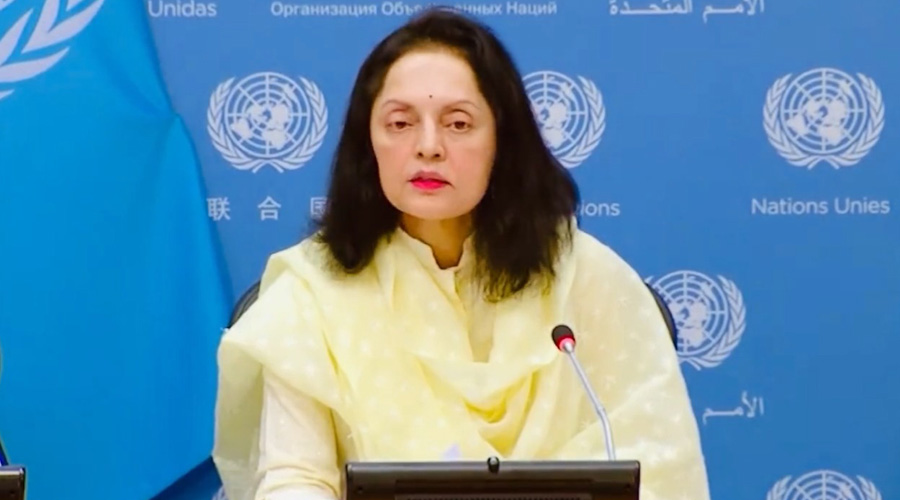India has said that the tendency to categorise terrorism on the basis of motivations behind terrorist acts is “dangerous” and asserted that all kinds of terror attacks, whether motivated by Islamophobia, anti-Sikh, anti-Buddhist or anti-Hindu prejudices, are condemnable.
India’s Permanent Representative to the UN Ambassador Ruchira Kamboj said on Thursday that the international community needs to stand guard against new terminologies and false priorities that can dilute its focus of combatting the scourge of terrorism.
“The tendency of categorisation of terrorism based on the motivations behind terrorist acts is dangerous and goes against the accepted principles that 'terrorism in all its forms and manifestations should be condemned and there cannot be any justification for any act of terrorism, whatsoever’,” she said at the First Reading of the Draft Resolution on 8th Review of the Global Counter-Terrorism Strategy (GCTS).
Underlining that there cannot be good or bad terrorists, Kamboj said such an approach “will only take us back to the pre-9/11 era of labelling terrorists as ‘Your Terrorists’ and ‘My Terrorists’ and erase the collective gains the international community has made over the last two decades.
“Moreover, some of the terminologies such as right or right-wing extremism, or far right or far left extremism opens the gate for misuse of these terms by vested interests. We, therefore, need to be wary of providing a variety of classifications, which may militate against the concept of democracy itself,” she said.
India also asserted that states that provide shelter to terrorists should be called out and held accountable for their deeds, a veiled reference to Pakistan.
The UN Global Counter-Terrorism Strategy is a "unique global instrument” to enhance national, regional and international efforts to counter-terrorism. Through its adoption by consensus in 2006, all UN member states agreed for the first time to a common strategic and operational approach to fighting terrorism.
“The Strategy does not only send a clear message that terrorism is unacceptable in all its forms and manifestations but it also resolves to take practical steps, individually and collectively, to prevent and combat terrorism," according to the UN Office of Counter-Terrorism.
The UN General Assembly reviews the Global Counter-Terrorism Strategy every two years, "making it a living document attuned to Member States’ counter-terrorism priorities”.
Kamboj stressed that it is important to protect the secular nature of the strategy. She said India strongly condemns all kinds of terrorist attacks irrespective of religion, belief, culture, race or ethnicity.
“We strongly condemn terrorist attacks motivated by Islamophobia, Christianphobia, Anti-Semitism, Anti-Sikh, Anti-Buddhist, Anti-Hindu prejudices,” she said.
She noted that the 7th Review of the strategy took into account attacks motivated by Islamophobia, Christianphobia and anti-Semitism only while failing to address the rest.
“A more sagacious approach would be to keep this reference broad, abandoning thereby a list-based approach in the current Review,” she said.
The UNGA resolution adopted in June 2021 on the 7th Review had recognized "with deep concern the overall rise in instances of discrimination, intolerance and violence, regardless of the actors, directed against members of religious and other communities in various parts of the world, including cases motivated by Islamophobia, antisemitism, Christianophobia and prejudice against persons of any other religion or belief.” Kamboj expressed concern that the threat of terrorism is persistent and rising, in particular, in Africa and Asia.
“As if we had less on our plate, the online space has become another frontier for terrorist groups to achieve their nefarious goals. The easy accessibility, affordability, anonymity, untraceability, and universal reach offered by new and emerging communications, financial, and other technologies, have played out as an exogenous multiplier factor exacerbating the terrorist threat manyfold,” she said.
She also noted that the Special Meeting of the Counter-Terrorism Committee, held in India in October last year and the Delhi Declaration adopted on countering the use of new and emerging technologies for terrorist purposes has highlighted this threat and also the need for a holistic approach to address this threat.
Kamboj appealed that "we may preserve the unity of unequivocal support to the strategy and not surrender the “consensus” to exclusivist and narrow approaches. A unified, multilateral action against terrorism has never been so inevitable as it is today." The global strategy is composed of four pillars- addressing the conditions conducive to the spread of terrorism; measures to prevent and combat terrorism; measures to build states’ capacity to prevent and combat terrorism and strengthen the role of the United Nations system in that regard; and measures to ensure respect for human rights for all and the rule of law as the fundamental basis for the fight against terrorism.
Kamboj said it is important to preserve the balance among all pillars and attempts to dilute the language of the second and third pillars will be a “self-defeating goal”, she said.
She added that ideally, the technical update should also have taken into account the activities and significant contributions of some international fora such as the Financial Action Task Force (FATF), due to which member states known for their laxity on terror financing were compelled to take preventive actions, another apparent reference to Pakistan.
Except for the headline, this story has not been edited by The Telegraph Online staff and has been published from a syndicated feed.










